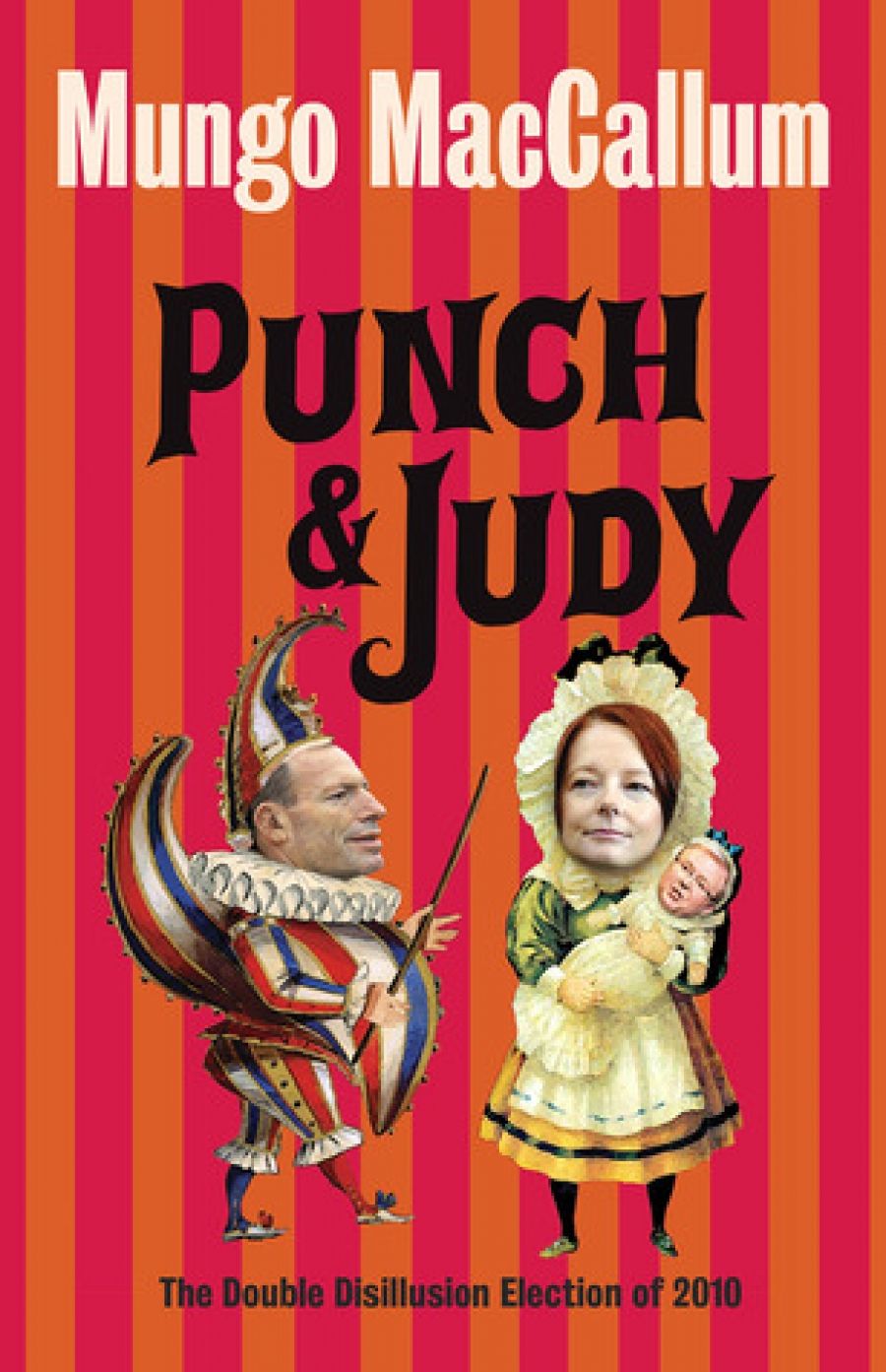
- Free Article: No
- Contents Category: Politics
- Review Article: Yes
- Online Only: No
- Custom Highlight Text:
The 2010 federal election fell on my wife’s birthday: 21 August. Being political tragics, we didn’t stop for birthday cake. Instead, we handed out roughly 1600 how-to-vote cards for the Australian Labor Party in suburban Melbourne. Our local polling booth is the Vista Valley Kindergarten, in Bulleen. This kindergarten cum polling booth, which sits in more of a gully than a valley and offers no vistas, is located in the north-eastern corner of the electorate of Menzies, held by ultraconservative Liberal frontbencher Kevin Andrews. The battle for Vista Valley mirrored the national poll. In the Vista Valley count, the ALP’s primary vote collapsed, the Greens’ soared, more people voted informal than backed Family First, yet, thanks to the preferences of Greens voters, Labor fell across the line by four votes.
- Book 1 Title: Punch and Judy
- Book 1 Subtitle: The double disillusion election of 2010
- Book 1 Biblio: Black Inc., $22.95 pb, 246 pp
Like many Labor supporters, I was dismayed but unsurprised by the swing. Handing out how-to-vote cards, scores of voters complained to me about the sameness of the campaigns. Or as veteran political commentator Mungo MacCallum puts it in his lightning account of the 2010 campaign:
From a policy point of view, the campaign was like a game of soccer in which both teams did little more than pass the ball backwards and forwards between the defenders and the only chance of a score was if a goalie fell over and let in an own goal. But just look at the half-time entertainment: the clowns on the sidelines, and the melodramatic pratfalls and phoney carry-on by the players. No, it wasn’t dull, but it was awful beyond parody.
Flashy similes such as this – not to mention the acerbic one-liners (‘The public seemed to greet the baring of Kevin Rudd’s soul with the same mixture of disbelief and distaste they had shown at the baring of Tony Abbott’s body’), snarky characterisations (The Australian’s Janet Albrechtsen and Greg Sheridan are called, respectively, a ‘dominatrix’ and a ‘most devout paranoiac’), back-in-my-day anecdotes about the likes of Gough Whitlam and Malcolm Fraser, and the occasional foray into whimsical doggerel – are the highlights of Punch and Judy. Unfortunately, those highlights are not enough to make up for the book’s deficiencies: namely, not enough insight, not enough analysis, and no overarching theme.
The book opens with The Weekend Australian’scrowning of one Labor prime minister (Kevin Rudd) as its Australian of the Year on 23 January, and closes with Independent MPs Tony Windsor and Rob Oakeshott crowning another Labor prime minister (Julia Gillard) as the Federation’s first elected female leader, on 7 September. Between those two dates, MacCallum more or less tells us what he thinks about the diurnal happenings of the protagonists.
As a result, Punch and Judy reads more like a 246-page opinion piece or an exceedingly long email than a book. The title seems little more than an afterthought, given than it is only tenuously connected to the content by the puppet-related quotes at the beginning of each chapter.
Adding to the disconnection is MacCallum’s remove from the fray. He spends most of the year living in northern New South Wales or travelling in far north Queensland. He appears to have only one face-to-face interaction with a major political player, when he buttonholes Gillard, deputy prime minister at the time, at an ALP fundraiser. That interview yields nothing worth reading: ‘We had a brief chat about election dates: “I bet it’s this year,” volunteered the deputy prime minister, very much the professional politician.’ And then there are the moments of gratuitous self-indulgence: ‘We had escaped a double-dissolution election only to be saddled with a Double Disillusion. Hey, that’s not a bad name for a book.’
The strength of MacCallum’s Gonzo-lite approach is that it can bring a vivacity to the writing – such as the barbed commentary on Rudd’s star-crossed attempts to establish an emissions trading scheme (‘an act of cowardice’) and The Australian’s largely one-eyed coverage of the campaign. Its weakness is that it lacks the insider gossip and anecdotes that are a political journalist’s bread and butter.
Without that inside knowledge, Punch and Judy has to rely solely on the strength of MacCallum’s writing. Unfortunately, the writing is reduced at times to mere typing by a ludicrously tight deadline: a printed and bound copy arrived in the offices of ABR on 14 September, just seven days after Windsor and Oakeshott’s decision to back the Gillard government. This means MacCallum had about as much time to compose his thoughts and make sense of the belated result of the 2010 campaign as, say, a daily newspaper’s editorial writer. It should come as no surprise, then, that he fails to properly address two of the big stories to come out of the 2010 campaign: the arrival of the Greens as a political force; and the putsch within the ALP to abandon lowest-common denominator policies and remain a progressive party.
Punch and Judy should have been held back for at least a week to give MacCallum and his editor, Chris Feik, more time to make sense of an election that so enraged and an after-election that so enthralled.
If you are a Mungo MacCallum fan, read his vastly superior memoir, Mungo: The Man Who Laughs (2001). If you want an incisive reading of the 2010 federal election, a better bet would be to wait until Quarterly Essay publishes Election 2010 and Beyond, by George Megalogenis.


Comments powered by CComment